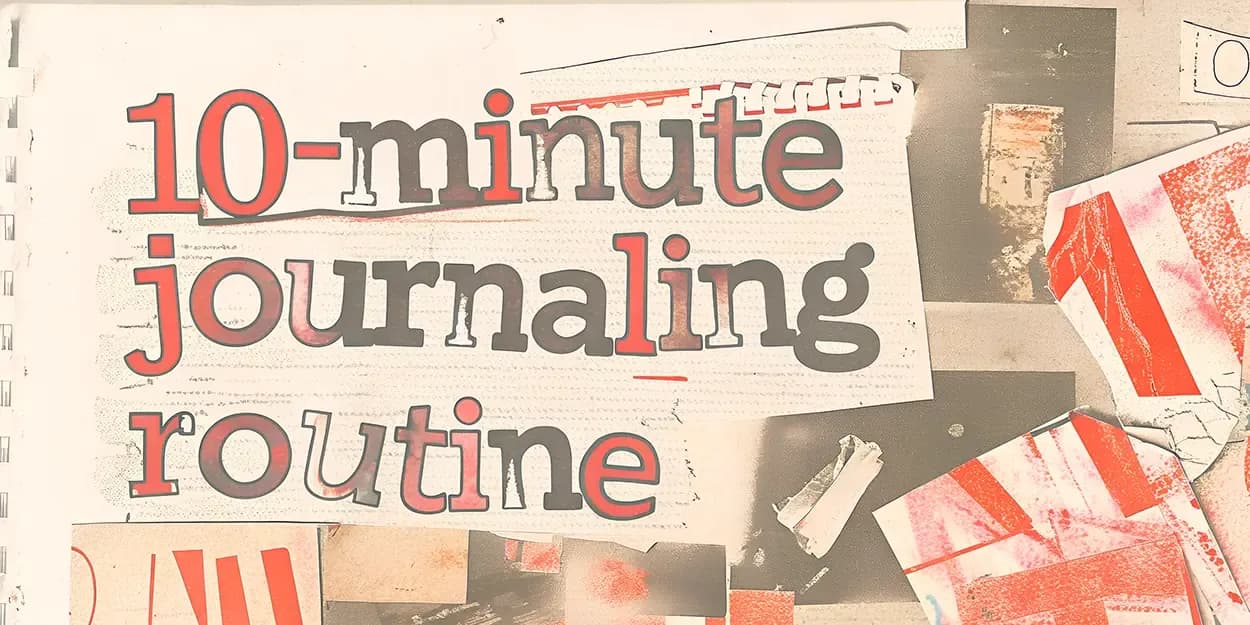Let's be honest – starting a journaling habit is one of those things that sounds simple in theory but feels surprisingly hard in practice. You buy a beautiful notebook, commit to writing every day, and then... life happens. Three days in, the journal sits abandoned on your nightstand, making you feel just a little bit guilty every time you see it.
Sound familiar? You're not alone. The good news is that building a journaling habit doesn't require superhuman willpower or hours of free time. It just requires the right approach. Here's how to start a journaling practice that actually fits into your real life and sticks around for the long haul.
Start Embarrassingly Small
Here's the mistake most people make: they decide to journal for 30 minutes every morning, pouring their hearts out onto the page in eloquent prose. That lasts about as long as most New Year's resolutions.
Instead, start so small it feels almost silly. Write just one sentence a day. That's it. Not a page, not even a paragraph – just one sentence about your day, your feelings, or something you noticed.
Why does this work? Because the hardest part of any habit isn't the doing – it's the starting. When your goal is laughably achievable, you eliminate the resistance that keeps you from opening that journal in the first place. Once you're writing that one sentence, you'll often find yourself continuing naturally. But even if you don't, you've kept your streak alive.
Pick Your Moment (and Make It Obvious)
Habits don't exist in a vacuum. They need a trigger – a specific time and place that reminds you to do them.
The best time to journal is whichever time you'll actually do it consistently. For some people, that's first thing in the morning with coffee. For others, it's during lunch break or right before bed. There's no "correct" time, only the time that works for your life.
Once you've chosen your moment, make your journal impossible to miss. Put it on your pillow if you journal at night. Place it next to your coffee maker if you're a morning person. The key is to remove any friction between you and the page.
Common Journaling Times and Their Benefits
Morning journaling:
- Sets intention for the day
- Clears mental clutter before work
- Captures dreams while they're fresh
- Pairs well with existing morning routines
Evening journaling:
- Processes the day's events
- Provides emotional closure
- Can improve sleep quality
- Works as a wind-down ritual
Lunchtime or break journaling:
- Offers midday mental reset
- Doesn't require extra time carved out
- Can help manage work stress
- Natural pause in the day
Drop the Pressure to Be "Good"
One of the biggest obstacles to journaling is the belief that you need to write something profound, grammatically perfect, or worth reading someday. Let me free you from that burden right now: your journal doesn't have to be good.
It can be messy. It can be boring. It can be repetitive. It can be full of typos, incomplete sentences, and thoughts that don't quite make sense. Your journal is a tool for processing your thoughts, not a manuscript you're submitting for publication.
Some of my most valuable journal entries are just lists of what I'm worried about, random observations, or honest confessions that would make zero sense to anyone else. That's exactly what they should be.
Use Prompts When You're Stuck
Staring at a blank page is intimidating. When you don't know what to write about, having a few go-to prompts can be the difference between journaling and giving up.
Here are some simple prompts that work for any day:
- What's one thing I'm grateful for today?
- What's taking up space in my mind right now?
- What did I learn today, even if it's something small?
- How am I feeling, and why might that be?
- What's one thing that went well today?
- What's one thing I want to remember about today?
You don't need to answer all of these – just pick one that resonates and start there. Over time, you'll probably find yourself moving beyond prompts naturally, but they're always there when you need them.
Build in Flexibility
Here's a counterintuitive truth about building habits: rigid rules often lead to failure. If you commit to journaling every single day without exception, the first time you miss a day (which will happen), you might feel like you've blown it and give up entirely.
Instead, aim for consistency, not perfection. Maybe your goal is to journal five days a week, or to write at least 15 times a month. This gives you built-in grace for the days when life is genuinely too chaotic, without abandoning the habit altogether.
The key is to never miss two days in a row. If you skip today, make tomorrow non-negotiable. This simple rule prevents that spiral where missing one day turns into missing a week.
Choose Your Format Wisely
Not everyone connects with the traditional pen-and-paper journal, and that's okay. The best journaling format is the one you'll actually use.
Paper journals work great if you:
- Find writing by hand meditative
- Like the tactile experience
- Don't need to search past entries often
- Prefer keeping things analog
Digital journals work better if you:
- Type faster than you write
- Want to journal from multiple devices
- Like being able to search past entries
- Value privacy features like encryption
- Journal on-the-go frequently
There's no right answer here. I've switched back and forth over the years depending on what felt right at the time. Don't get hung up on finding the "perfect" journal – just pick something and start.
Track Your Progress (Without Obsessing)
There's something motivating about seeing a streak build. Whether it's checking off days on a calendar or seeing your journal entries accumulate, visual progress can help reinforce the habit.
But here's the balance: track your consistency without letting it control you. If you miss a day, don't spiral. Just note it and move on. The goal is progress, not perfection.
Some people like using habit trackers or marking journal days on their calendar. Others prefer the natural accumulation of filled pages. Find what motivates you without adding stress.
What to Do When You Fall Off Track
Because you will. Everyone does. The difference between people who have a journaling practice and people who don't isn't that the first group never stops – it's that they know how to start again.
When you realize you haven't journaled in days (or weeks, or months), resist the urge to beat yourself up or write a dramatic "I'm starting over" entry. Just open your journal and write about today. That's it. You don't need to explain the gap or make promises about the future. Just write one entry and let that be enough.
The habit restarts the moment you do it again, not the moment you feel bad about not doing it.
Give It Time to Become Natural
Research suggests it takes anywhere from 18 to 254 days for a new behavior to become automatic, with the average being around 66 days. Translation: don't expect journaling to feel natural immediately.
For the first few weeks, it will require conscious effort. That's normal. You're building neural pathways, creating new routines, and establishing patterns. Stick with it through the awkward phase, and eventually you'll find that journaling becomes as automatic as brushing your teeth.
You'll know the habit has stuck when you start to feel slightly off on days you don't journal – when you miss having that moment of reflection and processing.
Make It Work for You
The most important thing to remember is that there's no single "right way" to journal. Some people write pages of flowing thoughts. Others bullet-point their way through the day. Some use fancy prompts and exercises. Others just vent.
Your journaling practice should serve you, not the other way around. If something isn't working, change it. Experiment with different times, formats, lengths, and approaches until you find what fits.
The perfect journaling habit is the one you'll actually maintain – and that looks different for everyone.
Your Turn
Starting a journaling habit doesn't require a perfect plan or ideal conditions. It just requires showing up, even in the smallest way, and building from there.
Pick one strategy from this article – maybe it's starting with just one sentence, or choosing a specific time, or dropping the pressure to write perfectly. Try it for a week and see what happens.
The journal that changes your life isn't the one with the most beautiful entries or the most consistent streak. It's the one you actually use.
If you're looking for a secure space to build your journaling practice, Comma offers zero-knowledge encryption so your thoughts stay truly private. Because the best journaling happens when you feel completely safe to be honest.


